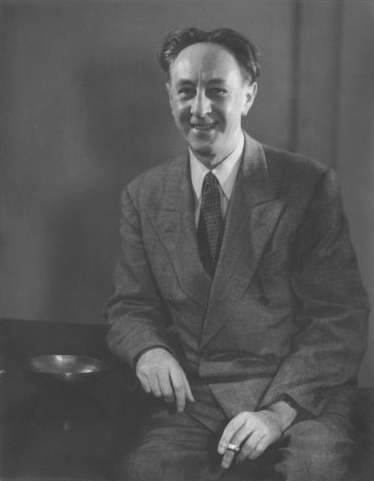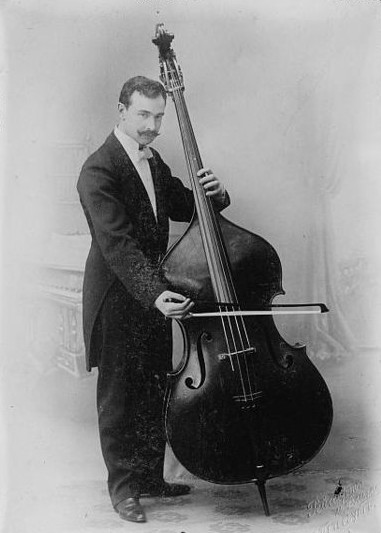|
Symphony No. 1 (Martinů)
The Symphony No. 1, H. 289, is an orchestral composition by the Czech composer Bohuslav Martinů. History On 19 December 1941, Martinů wrote a letter to Serge Koussevitzky, expressing a wish to compose a symphony for the Boston Symphony Orchestra for their next season. In reply, early in 1942 Koussevitzky commissioned a work for large orchestra in memory of his late wife Natalie. Despite the freedom offered in the commission, Martinů persisted in his intention to tackle the ambitious form of the symphony, with an eye to increasing his standing in American musical life. Work on the Symphony was begun in June with the first movement, in Jamaica. The two middle movements were composed in July in Middlebury, Vermont, and the finale was worked out in July and August, in Lenox, Massachusetts, while Martinů was teaching at the Berkshire Music Center. The score was completed on 1 September 1942, at Manomet, Massachusetts and was premiered on 13 November 1942 in Boston, with further per ... [...More Info...] [...Related Items...] OR: [Wikipedia] [Google] [Baidu] |
Bohuslav Martinů
Bohuslav Jan Martinů (; December 8, 1890 – August 28, 1959) was a Czech composer of modern classical music. He wrote 6 symphonies, 15 operas, 14 ballet scores and a large body of orchestral, chamber, vocal and instrumental works. He became a violinist in the Czech Philharmonic Orchestra, and briefly studied under Czech composer and violinist Josef Suk. After leaving Czechoslovakia in 1923 for Paris, Martinů deliberately withdrew from the Romantic style in which he had been trained. During the 1920s he experimented with modern French stylistic developments, exemplified by his orchestral works ''Half-time'' and ''La Bagarre''. He also adopted jazz idioms, for instance in his '' Kitchen Revue'' (''Kuchyňská revue''). In the early 1930s he found his main fount for compositional style: neoclassicism, creating textures far denser than those found in composers treating Stravinsky as a model. He was prolific, quickly composing chamber, orchestral, choral and instrumental w ... [...More Info...] [...Related Items...] OR: [Wikipedia] [Google] [Baidu] |
Serge Koussevitzky
Sergei Alexandrovich KoussevitzkyKoussevitzky's original Russian forename is usually transliterated into English as either "Sergei" or "Sergey"; however, he himself adopted the French spelling "Serge", using it in his signature. (SeThe Koussevitzky Music Foundations official web site Retrieved 5 November 2009.) His surname can be transliterated variously as "Koussevitzky", "Koussevitsky", "Kussevitzky", "Kusevitsky", or, into Polish, as "Kusewicki"; however, he himself chose to use "Koussevitzky". (russian: Серге́й Алекса́ндрович Кусеви́цкий, links=no; ''Sergey Aleksandrovich Kusevitsky''; 4 June 1951) was a Russian-born conductor, composer and double-bassist, known for his long tenure as music director of the Boston Symphony Orchestra from 1924 to 1949. Biography Early career Koussevitzky was born into a Jewish family of professional musicians in Vyshny Volochyok, Tver Governorate (present-day Tver Oblast), about 250 km northwest of Moscow ... [...More Info...] [...Related Items...] OR: [Wikipedia] [Google] [Baidu] |
Boston Symphony Orchestra
The Boston Symphony Orchestra (BSO) is an American orchestra based in Boston, Massachusetts. It is the second-oldest of the five major American symphony orchestras commonly referred to as the " Big Five". Founded by Henry Lee Higginson in 1881, the BSO performs most of its concerts at Boston's Symphony Hall and in the summer performs at Tanglewood. Since its founding, the orchestra has had 17 music directors, including George Henschel, Serge Koussevitzky, Henri Rabaud, Pierre Monteux, Charles Munch, Erich Leinsdorf, William Steinberg and James Levine. Andris Nelsons is the current music director of the BSO. Seiji Ozawa has the title of BSO music director laureate. Bernard Haitink had held the title of principal guest conductor of the BSO from 1995 to 2004, then conductor emeritus until his death in 2021. The orchestra has made gramophone recordings since 1917 and has occasionally played on soundtrack recordings for films, including ''Schindler's List''. History Early year ... [...More Info...] [...Related Items...] OR: [Wikipedia] [Google] [Baidu] |
Czech Philharmonic
The Česká filharmonie (Czech Philharmonic) is a symphony orchestra based in Prague. The orchestra's principal concert venue is the Rudolfinum. History The name "Czech Philharmonic Orchestra" appeared for the first time in 1894, as the title of the orchestra of the Prague National Theatre. It played its first concert under its current name on January 4, 1896 when Antonín Dvořák conducted his own compositions, but it did not become fully independent from the opera until 1901. The first representative concert took place on October 15, 1901 conducted by Ludvík Čelanský, the first artistic director of the orchestra. In 1908, Gustav Mahler led the orchestra in the world premiere of his Symphony No. 7. The orchestra first became internationally known during the principal conductorship of Václav Talich, who held the post from 1919 to 1931, and again from 1933 to 1941. In 1941, Talich and the orchestra made a controversial journey to Germany, where they performed Bedřich Smet ... [...More Info...] [...Related Items...] OR: [Wikipedia] [Google] [Baidu] |
Scottish National Orchestra
The Royal Scottish National Orchestra (RSNO) ( gd, Orcastra Nàiseanta Rìoghail na h-Alba) is a British orchestra, based in Glasgow, Scotland. It is one of the five national performing arts companies of Scotland. Throughout its history, the Orchestra has played an essential part in Scotland’s musical life, including performing at the opening ceremony of the Scottish Parliament building in 2004. Its music centre and rehearsal studios are directly connected to the Glasgow Royal Concert Hall. The RSNO performs throughout Scotland, at such venues as Glasgow Royal Concert Hall, Usher Hall, Caird Hall, Aberdeen Music Hall, Perth Concert Hall and Eden Court Theatre. Thomas Søndergård is the orchestra's current music director, since 2018. History The precursor ensemble to the RSNO was established in 1843 to accompany the Glasgow Choral Union (today known as the RSNO Chorus). In 1891, the orchestra was recognised formally as the ''Scottish Orchestra'', with George Henschel as the ... [...More Info...] [...Related Items...] OR: [Wikipedia] [Google] [Baidu] |
Bryden Thomson
Bryden Thomson (16 July 1928 – 14 November 1991) was a Scottish conductor remembered especially for his championship of British and Scandinavian composers. His recordings include influential surveys of the orchestral music of Hamilton Harty and Arnold Bax. He was principal conductor of several British orchestras, including the Ulster Orchestra, which flourished under his tenure. Biography Early life and studies Bryden ("Jack") Thomson was born in Ayr and grew up playing the violin and cello. Soon after entering the Royal Scottish Academy of Music in Glasgow on a scholarship at the age of 15, he was called up to serve in the Highland Light Infantry, where he played the piano in the regimental band and taught himself the clarinet. After the war, he returned to his studies at the Royal Scottish Academy of Music. In 1954, he moved to Germany to study conducting, first with Hans Schmidt-Isserstedt at the newly founded Hochschule für Musik in Hamburg, and then with Igor Markevitch ... [...More Info...] [...Related Items...] OR: [Wikipedia] [Google] [Baidu] |
Prague Radio Symphony Orchestra
The Prague Radio Symphony Orchestra (''Symfonický orchestr Českého rozhlasu'', Czech acronym SOČR, English acronym PRSO) is a Czech broadcast orchestra based in Prague, the Czech Republic. The SOČR performs concerts at the Dvořák Hall of the Rudolfinum, at the Forum Karlín and the Convent of Saint Agnes in Prague, as well as Studio 1 of Czech Radio in Prague. History The precursor ensemble of the SOČR was the Radiojournal Orchestra, which gave its first concert on 1 October 1926 under Jožka Charvát, the first chief conductor of the orchestra. By 1952, the popularity and size of the Radiojournal Orchestra was such that a second orchestra, the Prague Radio Symphony Orchestra, was split off from the Radiojournal Orchestra. By 1964, two separate orchestras were affiliated with Prague Radio, the Prague Radio Orchestra and the Prague Radio Symphony Orchestra. These orchestras subsequently combined to form the present orchestra. Since the 2018–2019 season, Alexander Liebrei ... [...More Info...] [...Related Items...] OR: [Wikipedia] [Google] [Baidu] |
Vladimír Válek
Vladimír Válek (born 2 September 1935, in Nový Jičín) is a Czech conductor. He was conductor of the Prague Symphony for 10 years, in which he made his first tours of Europe and the United States He was the Principal Conductor of the Slovak Philharmonic The Slovak Philharmonic or Slovak State Philharmonic (Slovenská filharmónia) is a Slovak symphony orchestra based in Bratislava. Founded in 1949, the orchestra has resided since the 1950s in the Baroque era Reduta Bratislava concert hall constr ... from 2004 until 2007, when he was succeeded by Peter Feranec. External linksBiography and discography from musicologica.cz(in Czech) 1935 births Living people People from Nový Jičín Czech conductors (music) Male conductors (music) Recipients of Medal of Merit (Czech Republic) 21st-century conductors (music) 21st-century Czech male musicians {{CzechRepublic-conductor-stub ... [...More Info...] [...Related Items...] OR: [Wikipedia] [Google] [Baidu] |
Henry Le Bœuf
Henry Le Bœuf (1874 in Schaerbeek – 1935) was a Belgian banker, patron of the arts and music lover. The stepson of Albert Thys, whose daughter Louise he married, he left his name to the Main Hall of the 2,200-seat Centre for Fine Arts, Brussels (established 1929), of which he promoted the foundation and funding. This room was built by the architect Victor Horta. Henry Le Boeuf occupied the castle of his father-in-law at Dalhem and contributed to the beautification of this locality by various urbanistic interventions still visible today: embellishments of houses and medieval ruins, restoration of the city hall (commemorative plaque sealed in the gable), construction of residences for artists and musicians in particular, paving of various streets. His granddaughter Christine was co-founder, with her husband Hubert Nyssen, of Éditions Actes Sud Actes Sud is a French publishing house based in Arles. It was founded in 1978 by author Hubert Nyssen. By 2013, the company, then hea ... [...More Info...] [...Related Items...] OR: [Wikipedia] [Google] [Baidu] |
Wolfgang Osthoff
Wolfgang Osthoff (17 March 1927 – 29 July 2008) was a German musicologist and professor (ordinarius) for historical musicology at the University of Würzburg. Life Born in Halle as son of the musicologist Helmuth Osthoff, Osthoff received his musical education from Kurt Hessenberg (sound composition) and Kurt Thomas (conducting) in Frankfurt. He studied musicology with his father and with Thrasybulos Georgiades, from whom he received his doctorate in Heidelberg in 1954 and with whom he habilitated in Munich in 1965. Studies in philosophy (among others with Hans-Georg Gadamer) and Middle Latin enabled him to understand music in a comprehensive context. His two-year study stay in Italy from 1955 to 1957 consolidated his love of Italian music. From 1968 to 1995 he was full professor of musicology at the Julius-Maximilians-University of Würzburg. Even after his retirement, he continued to teach at the Musicological Institute until his retirement. Osthoff was active in national ... [...More Info...] [...Related Items...] OR: [Wikipedia] [Google] [Baidu] |
Giselher Schubert
Giselher Schubert (born in 1944) is a German musicologist Life and career Born in Königsberg, Schubert studied musicology, sociology and philosophy at the Rheinische Friedrich-Wilhelms-Universität Bonn with Günther Massenkeil, at the Freie Universität Berlin with Rudolf Stephan and at the University of Zürich with Kurt von Fischer. In 1973 he was honored in Bonn with a thesis on instrumentation with Arnold Schönberg which gained him his "Ph.D.". Since 1974 he has been working as the editor of the Hindemith Complete Edition at the in Frankfurt, which he directed from 1991 to 2011. Since 2005 he has been co-editor of the Hindemith Complete Edition. From 1985 to 1996 he was co-editor of the journal ''Musiktheorie''. He is co-editor of the Kurt Weill complete edition and member of the editorial board of the Bohuslav Martinů Complete Edition. Until 2010 he was chairman of the Society for the Promotion of the Arnold Schönberg complete edition. Since 1986 he has been a freelan ... [...More Info...] [...Related Items...] OR: [Wikipedia] [Google] [Baidu] |




.jpg)